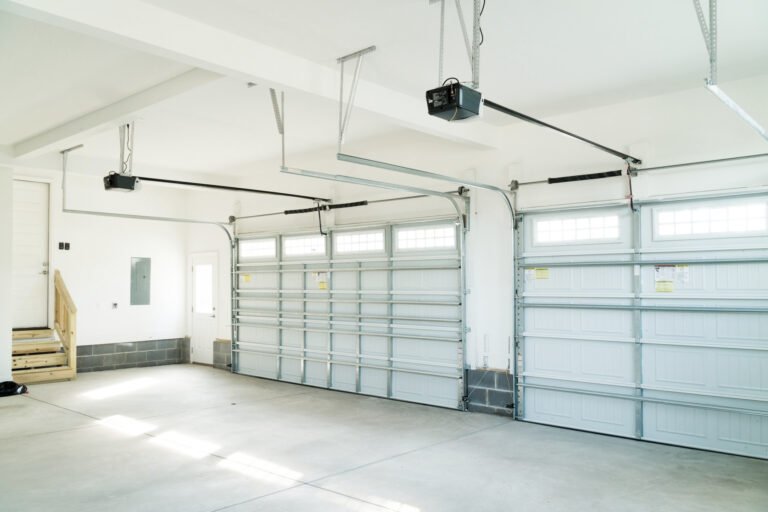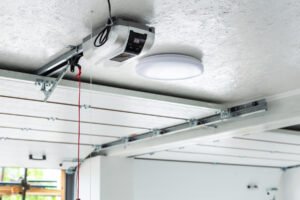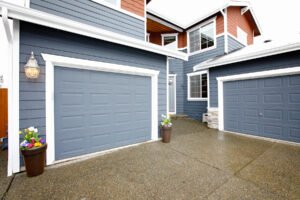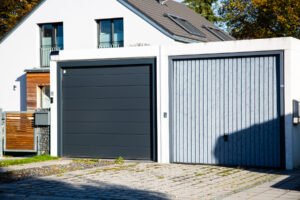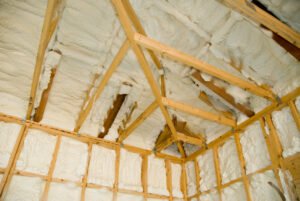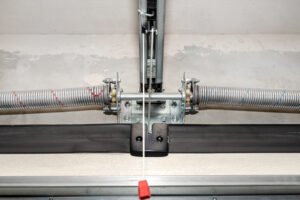You simply cannot miss a garage door opener when automating your garage and adding extra amenities and security to your home. These smart door openers manage the weight of the shutter, control it, and operate it as required, making your garage easy to access.
However, since harsh climatic conditions and constant wear and tear damage garage door openers, they will need repairs or even replacements to function efficiently. But how long do garage door openers last in general, and what are some quick hacks to make them last longer? Let’s find out.
A regular garage door opener usually lasts 15-25 years, but its lifespan depends on the type, brand, and quality of the DC motor. Generally, overhead or jackshaft door openers last much longer than conventional belt drive openers or chain drives.
Life Expectancy of Different Types of Garage Door Openers
Garage door openers come in various sizes, materials, and modes of operation, and each one has a different lifespan based on the mechanism used. The overall capacity and lifespan of the garage door opener depend on the proper maintenance, lubrication, general usage, and the types of garage doors.
Considering these parameters, let’s examine the lifespan of different types of garage door openers!
1. How Long Do Chain Drive Openers Last?
Chain drive openers typically last 10-12 years if properly lubricated. These are reasonably priced and include a connecting chain that regulates the operation of the trolley and motor. However, the friction caused by the continuous rubbing of the chain and vibration makes it less durable and difficult to maintain.
You can oil the connecting chain of any chain drive opener with white lithium grease, silicone lubricant, or any professional garage door opener lubricant to make it last longer without many repairs.
2. What Is the Average Lifespan of a Screw Drive Opener?
Screw-driven openers have a lifespan of 7-8 years. They can even last a little longer, but their parts might rust, break loose, or cause a noisy sound and weather away. Moreover, if your screw drive opener is about 9-10 years old, it’s best to replace it rather than spend more bucks on garage door repair.
Dip a lubricating, vehicle-washing cloth in a screw drive lube, and brush all the drive openers and the threaded steel rod for smooth functioning and less noise.
3. How Long Do Belt Drive Openers Last?
Belt-drive openers last about ten years. However, their lifespan depends on regular maintenance, lubrication, and the place’s climate. Generally, belt-drive openers work well for a longer time in cool climate zones, whereas their lifespan might reduce to about 7-8 years in a hot climate zone.
Older belt drive openers generally show wear and tear on the hinges and other hardware elements, and hence, it’s mandatory to check and replace rusted, weathered, or corroded hinges, rubber belts, and other essential elements.
4. What Is the Lifespan of an Overhead Door Opener?
Overhead garage doors are incredibly durable and may last for up to 25 years if maintained correctly. Although their lifespan depends on various factors, like the overhead door company and extension springs, most openers would still last for at least 20-21 years.
Pour a couple of penetrating oil drops into the pulley bearings of the garage door opener and the door itself for a smooth, noise-free door operation.
5. How Long Does a Chamberlain Garage Door Opener Last?
Typically, chamberlain garage door openers last for about 15-20 years, but the lifespan can vary depending on the lubrication and the frequency of use. If your old Chamberlain garage door opener starts making sounds, mismatches the level, or does not work correctly, you will need to repair it or even replace it.
6. How Long Do Liftmaster Garage Door Openers Last?
Liftmaster garage door openers last 20-22 years, subject to correct installation, good rollers and tracks, and regular maintenance. However, since these door openers are factory-grade and designed for commercial garage doors, they might warp, rust, and weather quickly if not used often.
What Causes a Garage Door Opener to Stop Working?
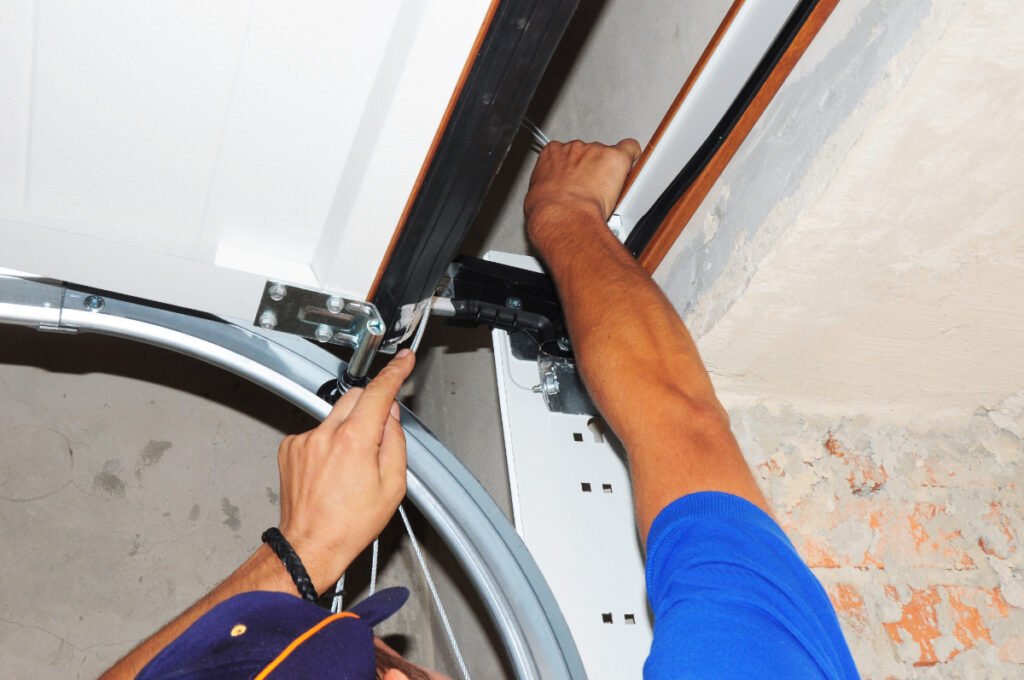
Garage door openers malfunction for several reasons. While some may be as simple as a disconnected power supply, other reasons, such as burned circuits or misaligned sensors, require quick repair and adjustments.
- Burned circuit: Automatic garage door openers will not receive remote control transmissions if the circuit breaker, fuse, or ground fault circuit interrupter (GFCI) trips or burns and will stop working immediately.
- Burned Garage Door Opener Motor: Your garage door opener’s DC motor might burn due to heavy use, rainfall, or if used for any heavy-duty commercial door. If this is the case, call an electrician or technician to replace it immediately.
- Dead Batteries: Dead garage door opener batteries cause a loss of transmission between the remote control and the opener, thus hampering its function and reducing the door opening speed.
- A Mismatched Close Limit: Your garage door opener has a close limit that regulates your DC motor and closes the door. Hence, if the close limit is not set to ground zero, it may hamper your door operation and cause your opener to malfunction.
- Sensitivity: Garage doors become too stiff in winter, and older garage door openers might not tackle the extra weight and rigidness. In such a case, adjust the opener’s sensitivity by rotating a screw fixed in the motor.
- Sensor Blockage: Trapped dirt and debris can re-align your sensors, thus hampering the smooth slide of your garage doors and causing the opener to malfunction.
Signs That Your Garage Door Opener Needs Urgent Repairs
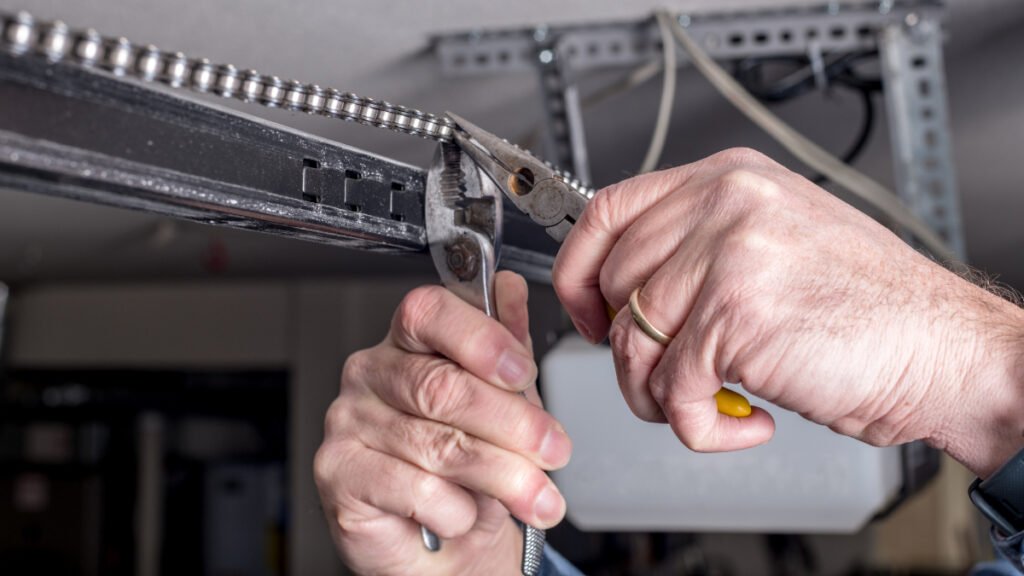
Despite a technical error, garage door openers never fail instantly and always give out some signs of weathering and wear out beforehand. If identified correctly, you can solve these issues with simple garage door opener repair without any replacement.
- Noises and Creaks: Broken springs, gears, wall mount brackets, or chain drives hamper the smooth functioning of tension springs in the garage door opener and cause noises as the door opens and closes. Oiling the weathered parts immediately can solve this issue.
- Slow Speeds: Any non-lubricated moving part or loose screw fitting reduces the operating speed of the door and needs repairs to prevent it from malfunctioning.
- Vibrating Garage Door: Vibrating garage door openers indicate weathering of tension or extension springs and, if left untreated, can damage your garage doors and drywalls.
- Uncontrolled Garage Door: Broken gear and motor boxes can disconnect your opener from the garage door and prevent its smooth operation. Thus, it needs repairs urgently.
When Should You Get a New Garage Door Opener?
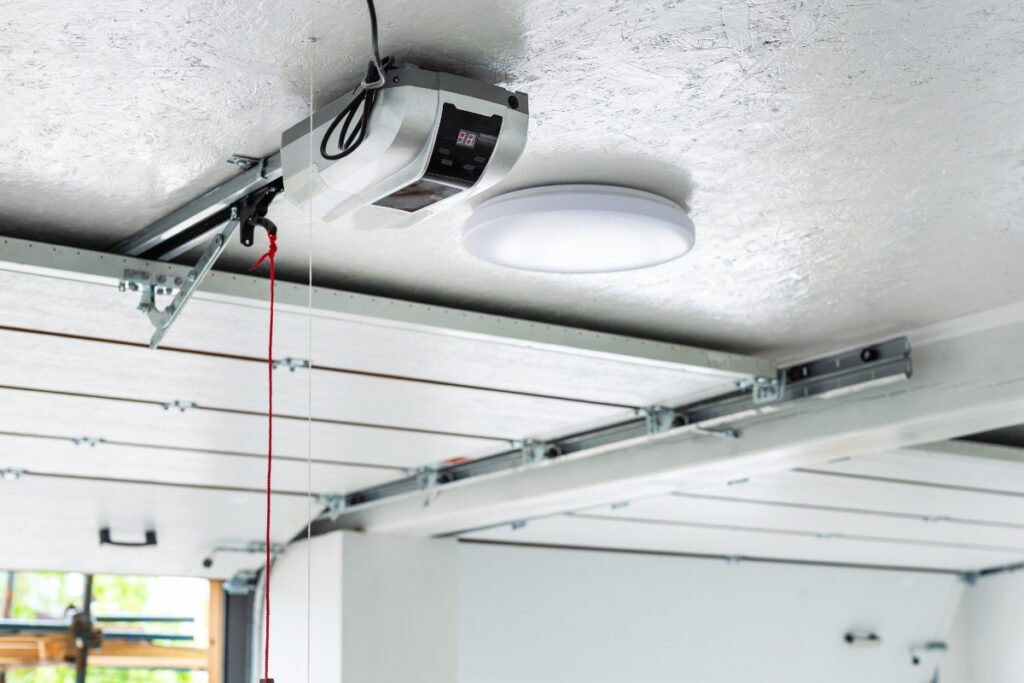
While some minor garage door opener issues can be fixed with repairs, some problems are too challenging to repair and might need replacement.
- Age: Garage doors usually last about 15 years, depending on the brand, material, and use. So, if you have an older opener, it’s advisable to replace it rather than spend hefty amounts on repairs.
- Failed Repairs: If your garage door opener misbehaves, even when you have already replaced or repaired its essential parts, the opener or the garage door installation itself might be at fault. In such a case, you will need a new opener.
- Automation: Garage door openers are continuously evolving, and many automated or smartphone-controlled openers are now entering the market. These make door operations smooth and easy, and hence, you might want to place your manual door opener with a fully automated, precision garage door opener.
- Reversal Systems: New garage door openers have a safety reversal system that prevents the door from banging into people or animals that unknowingly stand on its tracks. Thus, if you have children or pets at home, you should replace your old opener with a reversing one.
- Security: Newer garage door openers change their security code every time you lock or unlock the garage door service. This makes it impossible for thieves to duplicate the code and rules off the chances of any theft. Additionally, you can get sturdy garage door locks for more security.
- Battery Backup: Older garage door openers rely on electricity and might stop midway due to power failure. Thus, you can replace them with newer ones with a battery backup.
How to Maintain Your Garage Door Opener?
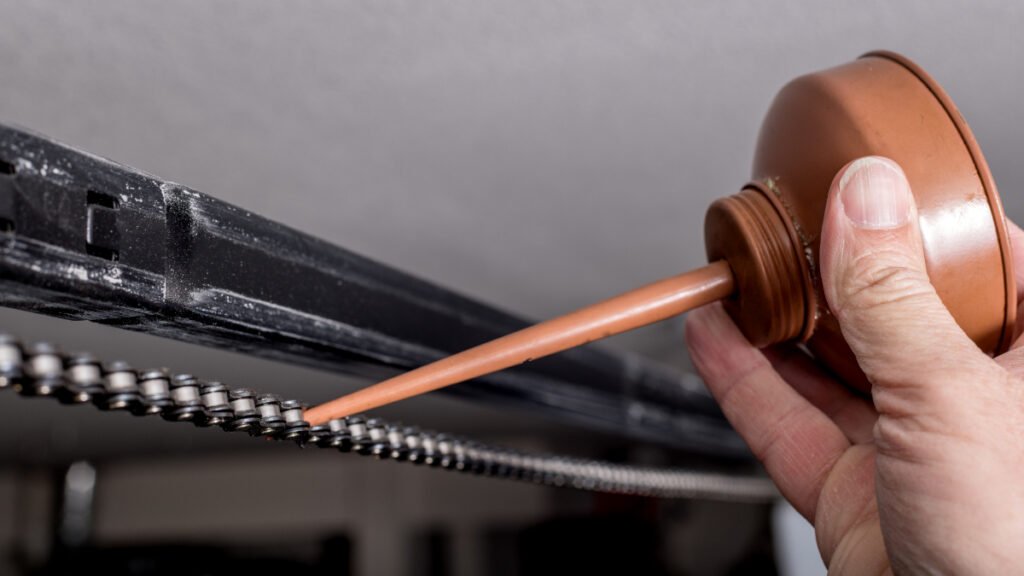
- Lubricate and Oil Springs, Rollers, and Tracks: Wipe all the moving parts of your doors and door openers with good-quality lubricating or penetrating oil for smooth and friction-free operation. Oiling will also reduce the rattling noise of the chain drivers.
- Yearly Inspection: Call a professional technician to inspect your door’s balance, sound, and performance to check for possible signs of weathering and failed parts.
- Door Sensitivity: Check your door sensitivity adjustments and ensure that they are not too sensitive to hamper the regular opening and closing of the door.
- Cleaning: Ensure that the opener blades are clean and free of any dust, debris, or moisture that might corrode them later.
- Test The Springs: Periodically inspect the tension and extension springs of garage door openers and replace them if they show any signs of wear and tear.
How to Extend the Garage Door Opener Lifespan?
Lubrication, regular maintenance, timely repairs, and inspection are the keys to ensuring optimal functioning and long-term operational life of your garage door opener.
Additionally, you’ll need to check different parts like garage door springs and door hinges for wear and tear and replace them immediately if damaged. Let’s take a look in detail.
- Rollers: Bad-quality rollers cause disturbances in garage door sliding, put additional pressure on the opener, and reduce its lifespan. Thus, to make your opener last longer, replace your rollers every 10-15 years.
- Tracks: Damaged or warped tracks may strain your opener and need immediate repair or replacement by a professional.
- Springs: Replace your tension and extension springs every 7-8 years to ease door sliding and extend the durability of the opener.
- Cables: Jagged or weakened cables displace the door off the track, which causes the opener to break instantly. Hence, replace your cables regularly after 8-9 years.
Tips for Fixing Your Garage Door Opener
- Never use regular household oil to lubricate your openers. For better operation, always prefer boundary or mixed machine oils, lithium grease, and spray silicone.
- If the door does not close fully and leaves a gap underneath, unplug or re-align the safety beam sensor to ground zero level.
- If the garage door opener doesn’t operate efficiently, replace or lubricate the gear, chain drives, or wall mounts.
- Periodically replace the weatherstripping of your garage door for a smooth sliding operation that neutralizes the extra pressure on your opener.
How Often Should You Replace Your Garage Door Opener?
Typically, you should get a new garage door opener once every 10-15 years, but you may change it earlier than that if it malfunctions, rusts, breaks, or if you want to update its technology.
How Long Do Garage Door Opener Springs Last?
Garage door opener springs typically last for about 5000 cycles but can last longer on regular maintenance and proper lubrication. On the other hand, heavy-duty or oil-tempered springs for commercial garages can last for about 10,000 cycles without any wear and tear.
How Much Does Garage Door Maintenance Cost?
Garage door maintenance typically costs about $130 for labor, and $50 to $300 for the main repair work, depending on the damage.
How Much Does Garage Door Replacement Cost?
A typical garage door replacement costs between $750 and $1500, depending on the automation level, materials, installation charges, geographic location, and the manufacturer. While steel garage doors cost between $450 and $1500, vinyl and fiberglass ones are a bit expensive and might cost about 2000$.
Garage door openers are certainly a boon to operating your garage doors efficiently, but you’ll need to make sure that you maintain and use them properly to enhance their durability.
I hope this guide has warned you of the problems and given some simple hacks to optimize your garage door opener for the better. But if you don’t want to bother maintaining your garage door opener, you can consider replacing your traditional garage door with these garage door alternatives!

